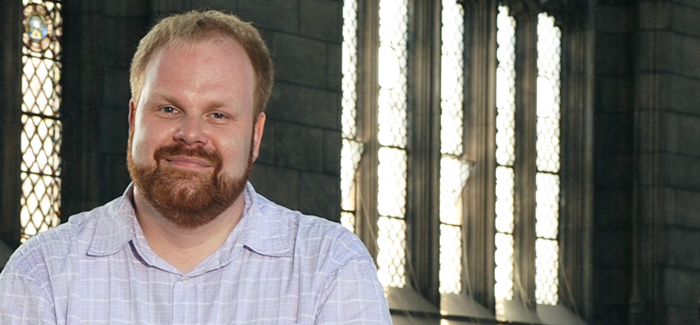
Sascha Ebeling. (Photography by Dan Dry)
Ready to explore Tamil literature? South Asia scholar Sascha Ebeling shares his favorite works in translation.
In the past 30 years, globalization and ethnic conflict have scattered the Tamil speaking population of India and Sri Lanka around the world, but Tamil literary works haven’t been translated widely to other languages. “Sadly, to this day almost all of Tamil literature continues to be a hidden treasure, since it is not well-known outside of India,” says Sascha Ebeling, associate professor in South Asian Languages and Civilizations and Comparative Literature. There are “wonderful works” from every period in the language’s 2,000-year history, he says, from ancient epics to 19th-century novels to contemporary poetry: “What continues to fascinate me is precisely the great diversity of themes and writing styles a reader of Tamil literature can encounter.”
Ebeling—who teaches advanced Tamil language courses as well as Tamil and world literature—has translated works himself to make them available to more readers. Here are his recommended Tamil-to-English translations of notable literary works, in roughly chronological order.
The Rapids of a Great River: The Penguin Book of Tamil Poetry
Edited by Lakshmi Holmström, Subashree Krishnaswami, and K. Srilata Penguin Global, 2010
A compilation that begins with the earliest known Tamil poetry—from the second century CE—and continues to the contemporary era.
The Interior Landscape: Classical Tamil Love Poems
Edited and translated by A. K. Ramanujan New York Review Books/Poets, 2014
“There is not much else in any Indian literature equal to these quiet and dramatic Tamil poems,” wrote Ramanujan, a translator, poet, and linguist who was the William H. Colvin Professor in South Asian Languages and Civilizations at UChicago until his death in 2003. The original collection appeared in 1967.
Poems of Love and War: From the Eight Anthologies and the Ten Long Poems of Classical Tamil
Translated by A. K. Ramanujan Columbia University Press, 2011
Ramanujan, my famous predecessor, was famous for making the oldest Tamil literature accessible by producing really beautiful translations into English. “If the poems now shimmer and smoulder in English,” adds David Shulman in his foreword, “it’s because A. K. Ramanujan happened upon them, in one of the early Tamil editions, one day in 1962 in the Harper Library at the University of Chicago.”
Tamil Love Poetry: The Five Hundred Short Poems of the Ainkurunuru
Translated and edited by Martha Ann Selby Columbia University Press, 2011
Another remarkable translation of classical Tamil poetry by Martha Ann Selby, PhD’94, a professor of South Asian studies at the University of Texas, Austin.
Poems to Siva: The Hymns of the Tamil Saints
Translated by Indira Viswanathan Peterson Princeton University Press, 1989
Composed by three poet-saints between the sixth and the eighth centuries CE, these hymns reflect “not only the theology but also the stark poetic beauty of early Tamil devotional Hinduism.”
The Tale of an Anklet: An Epic of South India
Translated, with an introduction by R. Parthasarathy Columbia University Press, 1993
In this “charming, ornate poem” the fifth-century CE poet Ilango Adigal recounts the epic love story of Kovalan and his faithful wife, Kannagi.
Red Lilies and Frightened Birds: Muttollayiram
Translated by M. L. Thangappa Penguin Books India, 2011
A collection of poems in praise of the three ancient Tamil royal dynasties, translated from the early medieval Tamil classic Muttollayiram.
The Life and Times of Pratapa Mudaliar
By Mayuram Vedanayakam Pillai Translated by Meenakshi Tyagarajan, with an afterword by Sascha Ebeling Katha, 2005
An English translation of the very first Tamil novel, written in 1879 by a retired district judge and social and cultural reformer who believed in the power of literature to shape a modern South Indian society. “It’s an odd and rambling picaresque tale,” says Ebeling, “but a wonderfully rich document of cultural history.”
Tamarind History
By Sundara Ramaswamy, translated by Blake Wentworth Penguin Books India, 2013
Ebeling calls this 1966 novel by novelist and poet Ramaswamy (1931–2005) a “modern classic,” and extolls the “brilliant new translation” by Divinity School graduate Blake Wentworth, AM’98, PhD’11.
A Second Sunrise
Poems by Cheran, edited and translated by Sascha Ebeling and Lakshmi Holmström Navayana, 2012
Among the living authors, Cheran is among my favorite poets for the profundity of his work,” says Ebeling. This collection contains 50 poems that Cheran—a Sri Lankan Tamil who lives in Canada—wrote over three decades, touching on war, nature, love, and loss.
The Hour Past Midnight
By Salma, translated by Lakshmi Holmström Zubaan, 2009
The debut novel by Salma, a Tamil poet, reflects on her upbringing and the lives of Muslim women in southern India. The translation premiered when the author and Holmström visited campus for the 2007 Norman Cutler Conference on South Asian Literature.
In a Forest, a Deer
Stories by Ambai, translated by Lakshmi Holmström Oxford University Press, 2006
Ebeling invited the short-story writer and women’s studies researcher Ambai (aka C. S. Lakshmi) to campus in 2009 and 2014. She’s one of several Tamil women writers doing “very new, unprecedented work about women's experiences and the female body,” he says.
The Oxford India Anthology of Tamil Dalit Writing
Edited by Ravikumar and Azhagarasan Oxford University Press India, 2012
Writing about caste and social differences is an important component of modern Indian, and Tamil, literature. This collection presents Dalit writing from the late 19th century to the present, gathering poetry, fiction, drama, and prose from Tamil Nadu.
In Our Translated World: Contemporary Global Tamil Poetry
Edited by Chelva Kanaganayakam TSAR, 2013
A bilingual-format collection of translated poems written during the last three decades around the world where Tamils have settled. “An exciting and insightful representation of contemporary global Tamil experience,” says Ebeling, including the voices of women and men; young and old; Hindu, Muslim, and Christian.
